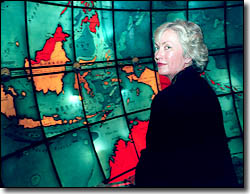Making the World Feel at Home

In 1979, Harvards 40 Iranian students underwent an overnight transformation.
From being nationals of a “friendly” country, under the Shah, they became suddenly suspect when an Islamic fundamentalist regime swept into office and radical students took over the U.S. embassy in Tehran, touching off the Iran Hostage Crisis.
Smoothing the way for those students who were concerned about family and friends back home and who also had to undergo a sudden round of Immigration and Naturalization Service interviews was the Harvard International Office, which acts as a facilitator and a buffer between the government and foreign students and fellows studying and working at Harvard.
Managing such sudden changes of international circumstances and staying ahead of the changing governmental rules as they relate to international students and scholars remains the major challenge facing the International Office as it begins the new millennium, according to the Offices incoming director, Sharon Ladd.
“One thing about this field and this office is things are always changing. Government regulations change and the world changes,” Ladd said.
Ladd, who has served as associate director since 1984, was recently named director to replace outgoing Director Seamus Malin. Ladds appointment is effective March 1. Malin commented about his successor, “I think she is an exceedlingly mature, personable, and enthusiastic person who has developed remarkable expertise that is unmatched around the country”
Ladd brings not just her many years of experience as associate director to her new post, but an institutional knowledge that stretches even further back. Ladd began working as a staff assistant in the International Office in 1972, having transferred from the Department of Romance Languages where she had assisted a professor from Italy with his green card papers.
Her career since then has been entirely within the Office, becoming an administrative assistant, assistant director and associate director.
Ladd said the continued challenge to meet changing conditions, combined with her interest in people with different backgrounds, has kept her interested and engaged in her work.
In announcing her appointment, University Marshal Richard Hunt praised Ladds experience in immigration policy.
” The main qualities that Sharon brings to her new position are experience and professionalism,” Hunt said. “As associate director of the International Office for two decades, she has assisted with the international student and scholar community, which has now reached 3,100 international students and 2,200 international scholars. . . .she is a gifted administrator and has acquired an expertise in immigration rules and procedures for students and scholars.”
The International Office helps Harvards foreign students and foreign scholars negotiate government red tape and settle into life at the University. The Offices role, Ladd said, is to be a continuing resource for the foreign students and scholars.
“One of our biggest challenges has been and continues to be providing a welcoming environment for students and scholars, not just when they first come, but for their entire stay,” Ladd said.
The International Office also offers a variety of services to ensure the students and their families dont become isolated. These programs include orientations, publications, social events, international clubs, English classes for spouses, and a host family program.
The office also provides help negotiating the maze of regulations involving U.S. income taxes. Another government program the office is monitoring is an Immigration and Naturalization Service pilot program to track foreign students electronically. The program, Ladd said, was started in response to the World Trade Center bombing, which involved a person here in the United States on a student visa.
Ladd said the International Offices role is to advocate for international students and scholars. “We try very hard,” said Ladd, “to make sure they are in compliance with complicated U.S. immigration regulations, while not appearing to be an arm of the government ourselves.”
Recent world events have left their mark on Harvards foreign students and scholars, Ladd said. With the breakup of the Soviet Union, more students and scholars are coming from Russia and former Eastern Bloc countries.
One of the most interesting future trends, she said, is the possibility of exchanges with Cuba as relations between the United States and the island nation slowly warm.
“I think were all interested in how that evolves,” Ladd said.
The advent of distance learning, made possible with new technology, could mean that foreign students will one day study with Harvard, rather than at Harvard. Ladd said students learning in their home countries via video and audio hookups could lead to new governmental regulations. She said Immigration and Naturalization Service officials may balk at providing student visas, normally given for months of study, if the student is just coming for a week or a long weekend to touch base with their instructor or to attend a class event.
Its the variety of the people and the ever-changing international situation that keep Ladd interested, she said.
” To meet people and find out about the work they do, to combine that with a good knowledge of government regulations, to work to the Universitys advantage and to students advantage, is very gratifying,” Ladd said.




